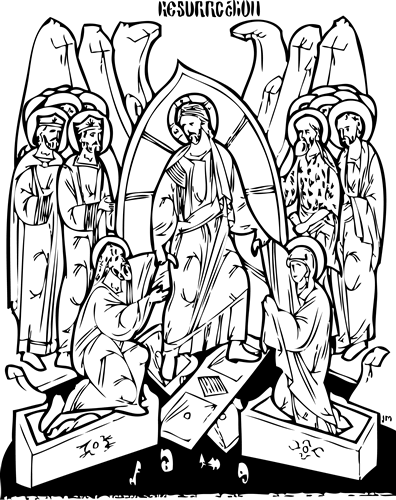|
|||
|---|---|---|---|
| This weekly bulletin insert complements the curriculum published by the Department of Christian Education of the Orthodox Church in America. This and many other Christian Education resources are available at http://dce.oca.org. | |||

On the day of the Resurrection of Our Lord, we have a special duty to the world around us. We need to help other people come to a true understanding of what Christ's rising from the dead means for the world. This is needed because there is so much misunderstanding of God's plan and intention. And that misunderstanding is often expressed with great certainty by people who are sure they know the "facts" about God, and what He does. For example, in an article published in the New Yorker Magazine, Adam Gopnik has written that Jesus's cry on the cross, "My God, my God, why have you forsaken me?" indicates failure. Gopnik states: "His father let him down, and the promise wasn't kept." But this is the exact opposite of what God did. The truth about His plan and work are well expressed in the Prayer of Commemoration in the Liturgy of Saint Basil, which we have heard all through Great Lent. That prayer reminds us that man(kind) was "set in a paradise of delight" but lost it through "his own transgressions." So God sent man forth from paradise, "returning [him] to the earth from which he was taken, yet providing for him the salvation of regeneration in Christ Himself." The prayer goes on to say that "it pleased Thine only-begotten Son...to condemn sin in His flesh, so that those who were dead in Adam might be made alive by Thy Christ Himself." Christ "made for all flesh a path to the resurrection from the dead." These words mean that the Father and the Son agreed that Christ should come into the world, and should suffer, be crucified and raised. It was the only way He could once and for all defeat the power of death. In Luke 24: 12-35 Jesus Himself gives the reason for His agonizing death. It is the story of the two travelers on the road to Emmaeus who meet the risen Jesus but do not recognize Him. As they walk along together, Jesus reminds them of all the prophecies of the Old Testament. He asks them, "Was it not necessary that the Christ should suffer these things and enter into His glory?" (24: 26). That word "necessary" is significant. It surely wasn't necessary for the Son of God, as God, to suffer and die. He is alive forever with His Father. But His creatures transgressed and could not save themselves from the deadly consequences of what they had done. To save them, it became necessary. We are the children of a God who refuses, as Saint Basil's prayer says, to "turn His face away from His creatures forever." No matter what we do, He will never forget us, because we are "the work of His hands." His love is so great, His determination not to let us perish is so absolute, that He will do anything for us. On this day of Pascha we celebrate that love and the eternal life it brings us. |
|||
